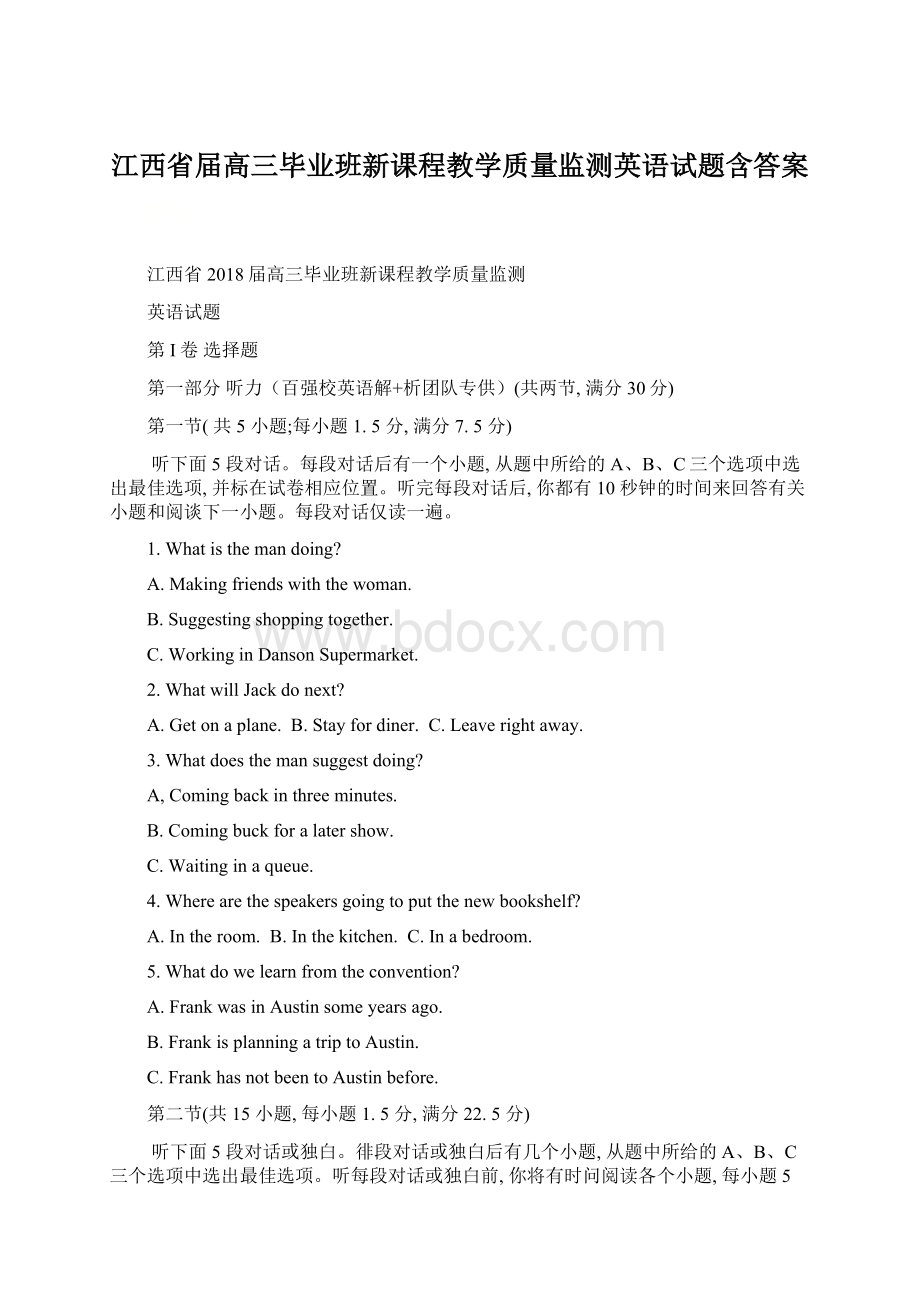江西省届高三毕业班新课程教学质量监测英语试题含答案.docx
《江西省届高三毕业班新课程教学质量监测英语试题含答案.docx》由会员分享,可在线阅读,更多相关《江西省届高三毕业班新课程教学质量监测英语试题含答案.docx(12页珍藏版)》请在冰豆网上搜索。

江西省届高三毕业班新课程教学质量监测英语试题含答案
江西省2018届高三毕业班新课程教学质量监测
英语试题
第I卷选择题
第一部分听力(百强校英语解+析团队专供)(共两节,满分30分)
第一节( 共5 小题;每小题1.5 分,满分7.5 分)
听下面5 段对话。
每段对话后有一个小题,从题中所给的A、B、C三个选项中选出最佳选项,并标在试卷相应位置。
听完每段对话后,你都有10 秒钟的时间来回答有关小题和阅谈下一小题。
每段对话仅读一遍。
1.What is the man doing?
A.Making friends with the woman.
B.Suggesting shopping together.
C.Working in Danson Supermarket.
2.What will Jack do next?
A.Get on a plane.B.Stay for diner.C.Leave right away.
3.What does the man suggest doing?
A,Coming back in three minutes.
B.Coming buck for a later show.
C.Waiting in a queue.
4.Where are the speakers going to put the new bookshelf?
A.In the room.B.In the kitchen.C.In a bedroom.
5.What do we learn from the convention?
A.Frank was in Austin some years ago.
B.Frank is planning a trip to Austin.
C.Frank has not been to Austin before.
第二节(共15 小题,每小题1.5 分,满分22.5 分)
听下面5 段对话或独白。
徘段对话或独白后有几个小题,从题中所给的A、B、C 三个选项中选出最佳选项。
听每段对话或独白前,你将有时问阅读各个小题,每小题5 秒钟;听完后,各小题将给出5 秒钟的作答时间。
每段对话或独白读两遍。
听第6 段材料,回答第6 至7 题。
6.Why can’t the girl go to the cinema tonight?
A.She has to look after her brother,
B.She’ll help her brother do his homework.
C.She’ll do boxing exercises.
7.What will the bay do tonight?
A.Go to a basketball match.
B.Go to the cinema.
C.Watch boxing on television.
听第7段材料,回答第8至9题。
8.What is the relationshipbetween the speakers?
A.Friends.B.Strangers.C.Husband and wife.
9.Why can’t Suzy goanywhere?
A.There’s no ticket left for anywhere.
B.She has lost her money and the ticket.
C.She has missed her train.
听第8段材料,回答第10至12题。
10.What is the conversation about?
A.How to take examinations in school.
B.How to arrange the examinations in the classroom.
C.How to take examinations on line.
11.Which of the followings are needed in the long-distance examinations?
A.Examination rooms and pencils.
B.Examination supervisors( 监管者)and rooms.
C.Pencils,erasers and examination supervisors.
12.How are the questions and answers sent in the long-distance examination?
A.By handing them to the students.
B.By announcing them.
C.By the Internet.
听第9段材料,回答13 至16题。
13.What is Deric,Wan Siu Lun?
A.A famous singer.B.The man’s friend.C.Thewoman’shusband.
14.Which is right according to the conversation?
A.John prefers to go to Hong Kong by sea.
B.Deric’s concert is in May.
C.Deric’s concert will be in Beijing.
15.Why does the man prefer to go by plane?
A.It is more interesting.B.It is cheaper.C.It is the safest.
16.How long would it take to go toHong Kong by sea?
A.About half an hour.B.About one day.C.About three days.
听第10 段材料,回答第17 至20 题。
17.What is the speech mainly about?
A.A large variety of animals.
B.Crop diversity.
C.The increasing population.
18.How many different plants exist now?
A.One hundred.B.One thousand.C.Hundreds of thousands.
19.What has happened to plants in the world over the past century?
A.They have stayed the same.
B.They have continued to decrease.
C.They have continued to increase.
20.What are responsible fordamaging plant life?
A.Climate change,loss of habitat,human activities and so on.
B.Climate change,human activities and the disappearance of genes.
C.Loss of habitat,poorly planned and traditional farming methods.
第二部分阅读理解(百强校英语解+析团队专供)(共两节,满分40分)
第一节(共15小题;每小题2分,满分30分)
阅读下列短文,从每题所给的A、B、C和D四个选项中,选出最佳选项。
A
USpresidentDonaldTrumphaspopularizedthephrase“fakenews”ButnottoolongagothesewordsincombinationwouldhavemeantlittletoeverydayEnglishspeakers.
AnatolyLiberman,aGerman,writesabouttheoriginsoftheword“fake”.Theword,itturnsout,hasaverydarkpast.Thebestguessforhow“fake”becamemainstream,arguesLiberman,isthatitwasakindusedbythievesintheLondonunderworld.But“howitgotthere,nobodyintheworldknows,andprobablynobodywilleverknow,”hetellsQuartz.
LibermanisaprofessorattheUniversityofMinnesotaandtheauthorofWordOriginsandHowWeKnowThem.Hewritesthatearlyrecordsof“fake”asanEnglishadjectiveappearedaroundthemiddleofthe18thcentury.Thewordlikelycomesfromcant,orthiefjargon(行话).
TheOEDmentions“fake”asaverbstartingin1819,whichbasicallymeant‘todo”injargon,butalso“tokill,wound,orrob”.Anentryfromadictionarythatyearreads:
“Tofakeanypersonorplace,torobthem;tofakeapersonmayalsoimplytoshoot,wound,orcut;tofakeamanoutandout,istokillhim.”
LibermantracesthewordnexttoCharesDickens,whoused“cly-faker”,where“cly”meanspocket,inOliverTwist.Thisishowhebelievesknowledgeof“fake”asawordthatmeanstosteal,spread.EventuallyitbecameacommonplaceEnglishword.
21.Theunderlinedword“fake”inParagraph1probablymeans.
A.lying
B.true
C.common
D.interesting
22.WhatcanwelearnaboutAnatolyLiberman?
A.Heisskilledinsomeforeignlanguages.
B.HeisinterestedinalltheEnglishwords.
C.HelivedinEnglandforalongtime.
D.HelikeswritingarticlesinEnglishverymuch.
23.Whatismainlydiscussedinthispassage?
A.ThehistoryofEnglishwords.
B.SomestoriesaboutEnglishwords.
C.TheimportanceoftheEnglishword“fake”
D.TheoriginsofanEnglishword.
24.Whatcanweinferfromthispassage?
A.WemustfocusonthewordsofDonaldTrump.
B.WeshouldstudyEnglishwordsverycarefully.
C.“Fake”likelycomesfromwordsusedbyaclassofpeople.
D.AnatolyLibermanlikestotracethecommonplaceEnglishwords.
B
Competitionoccursnaturallybetweenlivingbeingswhichco-existinthesameenvironment.Inmodernsocietythereisagreatdealofargumentaboutcompetition.Somevalueithighly,believingthatitisresponsibleforsocialprogressandprosperity(繁荣).Otherssaythatcompetitionisbad;thatitsetsonepersonagainstanother;thatitleadstounfriendlyrelationshipbetweenpeople.
Ihavetaughtmanychildrenwhoheldthebeliefthattheirselfworthreliedonhowwelltheyperformedattennisandotherskills.Forthemplayingwellandwinningareoftenlifeanddeathaffairs.Intheirsinglemindedpursuit(追求)ofsuccess,hedevelopmentofmanyotherhumanqualitiesissadlyforgotten.
However,whilesomeseemtobelostindiedesiretosucceed,otherslakeanoppositeattitude.Inaculturewhichvaluesonlydiewinnerandpaysnoattentiontotheordinaryplayers,theystronglyblamecompetition.Amongthemostvocalareyoungsterswhohavesufferedundercompetitivepressuresfromtheirparentsorsociety.
Teachingtheseyoungpeople,Ioftenobserveinthemadesiretofail.Theyseemtoseekfailurebynottryingtowinorachievesuccess.Bynottrying,theyalwayshaveanexcuse:
”Imayhavelost,butitdoesn’tmatterbecauseIreallydidn’ttry.”Whatisnotusuallyadmittedbythemselvesisthebeliefthatiftheyhadreallytriedandlost,thatwouldmeanalot.Suchalosswouldbeameasureoftheirworth.Clearly,thisbeliefisthesameasthatofthetruecompetitorswhotrytoprovethem-selves.Botharebasedonthemistakenbeliefthatone’sselfrespectreliesonhowwelloneperformsincomparisonwithothers.Bothareafraidofnotbeingvalued.Onlyasthisbasicandoftentroublesomefearbeginstodissolve(缓解)canwediscoveranewmeaningincompetition.
25.Whichisthemainpointofthispassage?
A.Competitionisaninterestingexperienceinone’slife.
B.Competitionishelpfultosetupself-respect.
C.Competitionisharmfultopersonalqualitydevelopment.
D.Differentopinionsaboutcompetitionamongpeople.
26.Whydosomepeoplevaluecompetitionhighly?
A.Theythinkitmakesnationsbecomerich.
B.Theythinkithelpstoimprovepeople’sabilities.
C.Theythinkithasthedutytopushsocietyforward.
D.Theythinkitmakesnationsmorecomplete.
27.Whatisthemeaningoftheunderlinedphrase“themostvocal”inParagraph3?
A.Thosewhostronglyblamecompetition.
B.Thosewhovaluecompetitionhighly.
C.Thosewhowantsuccessverymuch.
D.Thosewhofailmanytimes.
28.Whatcanweknowaboutcompetition?
A.Itcandetermineone’sachievement.
B.Itswinningshouldbecomealife-and-deathmatter.
C.Itshouldbeencouragedinallcountriesin.theworld.
D.Itariseswhenagoalcannotbeshared.
C
You’reouttodinner.Thefoodisdeliciousandtheserviceisfine.Youdecidetoleaveabigfattip.Why?
Theanswermaynotbeassimpleasyouthink.
Tipping,psychologistshavefound,isnotjustaboutservice.Instead,studieshaveshownthattippingcanbeaffectedbypsychologicalreactionstoaseriesofdifferentfactorsfromthewaiter’schoiceofwords,tohowtheycarrythemselveswhiletakingorders,tothebill’stotal.Evenhowmuchwaitersremindcustomersofthemselvescandeterminehowmuchchangetheypocketbytheendofthenight.
“Studiesbeforehaveshownthatmimicry(模仿)bringsintopositivefeelingsforthemimicker,”wroteRickvanBaaren,asocialpsychologyprofessor.“Thesestudiesshowthatpeoplewhoarebeingmimickedbecomemoregeneroustowardthepersonwhomimicsthem.”
SoRickvanBaarendivided59waitersintotwogroups.Herequestedthathalfservewithaphrasesuchas.“Comingup!
”Thoseintheotherhallwereinstructedtorepeattheordersandpreferencesbacktothecustomers.RickvanBaarenthencomparedtheirtake-homepay.’Theresultswereclear—itpaystomimicyourcustomer.Thecopycat(模仿者)waitersearnedalmostdoubletheamountoftipstotheothergroup.
LeonardGreenandJoelMyerson,psychologistsatWashingtonUniversityinSt.Louis,foundthegenerosityofatippermaybelimitedbyhisbill.Afterresearchonthe1,000tipsleftforwaiters,cabdrivers,hairstylists,theyfoundt